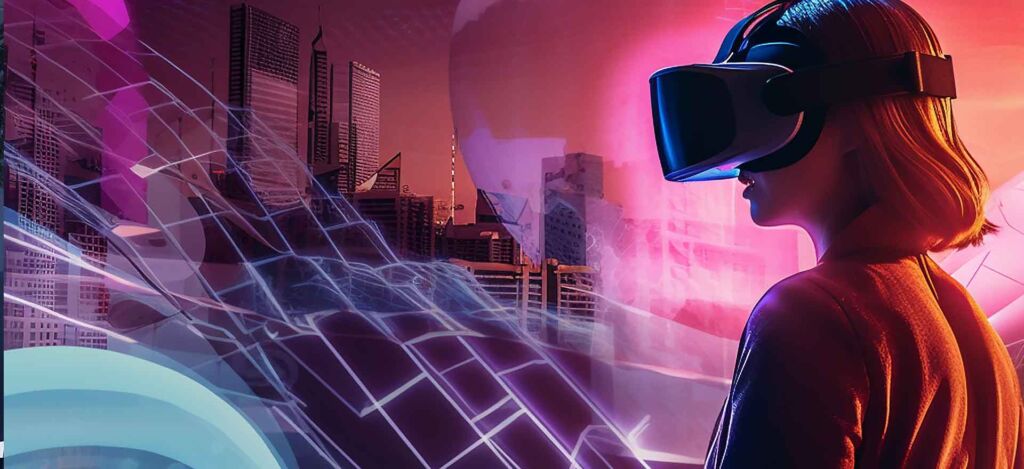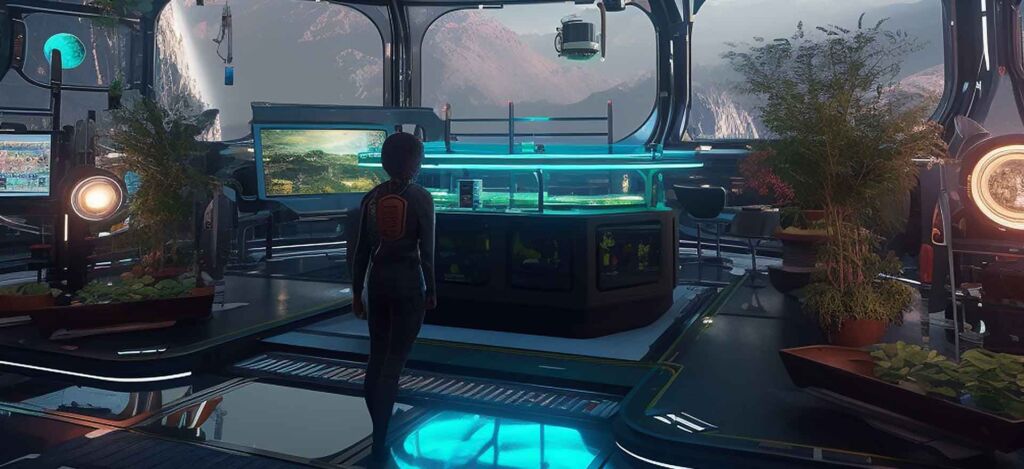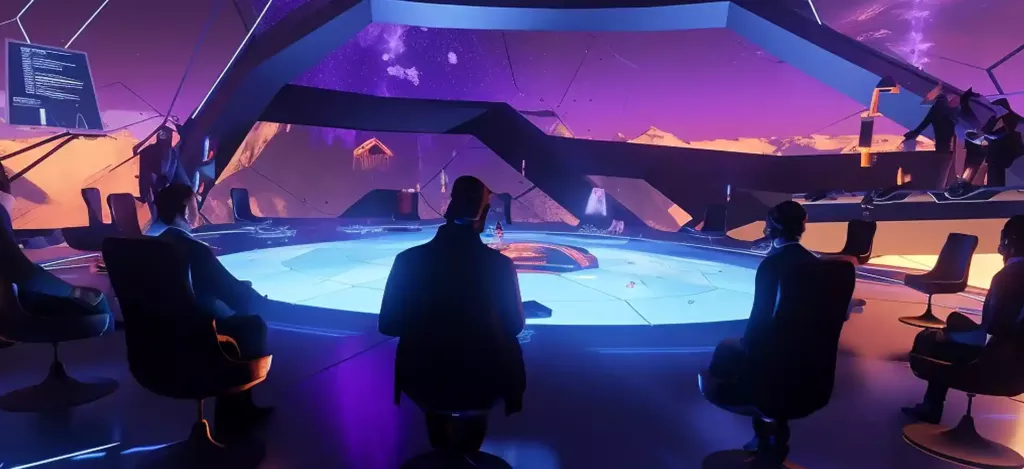Exploring the Metaverse and Beyond
The digital landscape is ever-evolving, pushing the boundaries of our imagination and redefining the ways we interact, work, and play. At the forefront of this technological revolution is the Metaverse – a concept that has been gathering momentum in recent years. As we stand on the precipice of a new era, it is essential to analyze emerging trends, potential innovations, and the future of the Metaverse. This comprehensive exploration will delve into the intricacies of this new digital realm and shed light on the opportunities and challenges that lie ahead.
1.- What is the Metaverse?
The Metaverse refers to a collective virtual space that encompasses various digital environments and experiences. In the Metaverse, users can interact with one another in real-time through avatars, engage in activities, and traverse different digital worlds. This convergence of physical and digital spaces is enabled by various technologies, such as virtual reality (VR), augmented reality (AR), and blockchain.
1.1 The concept of the Metaverse
It has its roots in science fiction, most notably Neal Stephenson’s 1992 novel “Snow Crash,” which depicted a vast, immersive virtual reality where users could interact with one another and engage in various activities. Today, the Metaverse is becoming a reality, with companies like Facebook (now Meta Platforms), Epic Games, and Roblox making significant strides in building and expanding this shared digital space.

2.- Emerging Trends in the Metaverse
As the Metaverse continues to develop, several key trends are emerging that will shape its future.
2.1 Virtual Economies
One of the most exciting aspects of the Metaverse is the potential for virtual economies to thrive. Users can buy, sell, and trade digital goods and services, such as clothing for avatars, virtual real estate, and digital art. This has given rise to the concept of “play-to-earn” gaming, where players can earn digital currencies and assets through gameplay, which can then be converted into real-world value.
2.2 Decentralization
Blockchain technology plays a significant role in the decentralization of the Metaverse. By utilizing blockchain’s inherent features like immutability, transparency, and security, the Metaverse can become a more democratic and accessible space. Decentralized autonomous organizations (DAOs) and decentralized finance (DeFi) platforms are also expected to play a crucial role in the governance and economy of the Metaverse.
2.3 Interoperability
Interoperability is the ability of different digital platforms and environments to seamlessly connect and interact. In the Metaverse, this would mean that users can easily move between various digital worlds, bringing their digital assets and identities with them. This cross-platform compatibility will be vital in creating a cohesive and expansive Metaverse ecosystem.
2.4 Virtual and Augmented Reality
The immersive experiences offered by VR and AR technologies are fundamental to the Metaverse. These technologies enable users to feel present within digital spaces and interact with digital objects in more intuitive ways. As VR and AR technologies continue to advance, we can expect more realistic and engaging experiences in the Metaverse.
2.5 Artificial Intelligence
Artificial intelligence (AI) will play a significant role in the evolution of the Metaverse, powering everything from personalized experiences and recommendations to advanced analytics and dynamic virtual environments. AI will also be crucial in creating realistic non-player characters (NPCs) and automating complex processes in the virtual world.

3.- Potential Innovations in the Metaverse
The Metaverse’s rapid development opens the door for numerous innovations and opportunities.
3.1 Virtual Workspaces
The COVID-19 pandemic has accelerated the adoption of remote work, making virtual workspaces a reality for many professionals. The Metaverse offers the potential for more immersive and interactive workspaces, with virtual offices and meeting rooms that facilitate collaboration and communication. As spatial computing and haptic feedback technologies improve, the line between physical and virtual workspaces may become increasingly blurred.
3.2 Virtual Events and Concerts
The Metaverse has already seen numerous virtual events and concerts, such as the Travis Scott concert in Fortnite and the Lil Nas X concert in Roblox. These events offer unique and engaging experiences, attracting millions of viewers worldwide. As the Metaverse expands, we can expect even more sophisticated and immersive virtual events, ranging from music festivals and sporting events to conferences and trade shows.
3.3 Education and Training
The Metaverse presents a wealth of opportunities for education and training. Virtual classrooms can provide immersive learning experiences, with students from around the world able to interact and collaborate in real-time. Furthermore, virtual simulations and training scenarios can offer practical, hands-on learning experiences in fields like medicine, aviation, and engineering, without the associated risks or costs of physical training.
3.4 Virtual Tourism and Exploration
With virtual reality, users can explore digital representations of real-world locations or even entirely fictional environments. The Metaverse can provide virtual tourism experiences that allow users to visit famous landmarks, museums, and natural wonders without leaving their homes. This has the potential to democratize travel, making it more accessible and sustainable.
3.5 Socialization and Community Building
As the Metaverse evolves, it will increasingly serve as a platform for socialization and community building. Users will be able to form connections, engage in shared experiences, and participate in group activities across various digital platforms. This will also facilitate the development of niche communities based on shared interests and passions.

4.- Challenges and Concerns in the Metaverse
While the Metaverse offers numerous opportunities and innovations, it also presents several challenges and concerns.
4.1 Digital Divide
The digital divide refers to the gap between those with access to technology and those without. As the Metaverse becomes more integral to our daily lives, it is crucial to ensure that it remains accessible and inclusive. This means addressing issues like internet accessibility, affordability of devices, and digital literacy.
4.2 Privacy and Security
Privacy and security are significant concerns in the Metaverse, as the vast amount of personal data generated within these digital environments can be susceptible to misuse or breaches. Robust security measures and privacy policies will be essential in protecting user data and maintaining trust in the Metaverse.
4.3 Mental Health and Well-being
Spending excessive amounts of time in the Metaverse could potentially have adverse effects on users’ mental health and well-being. Striking a balance between digital and physical experiences is crucial in maintaining healthy lifestyles. It will be essential to develop resources and tools that promote responsible usage and digital wellness.
4.4 Content Moderation and Governance
As the Metaverse expands, content moderation and governance become increasingly complex. Striking a balance between protecting user safety and freedom of expression will be a delicate task. Decentralized governance models, such as DAOs, may offer potential solutions for community-driven moderation and decision-making.
Conclusion
The Metaverse represents a paradigm shift in the way we interact with technology and one another. By understanding the emerging trends, potential innovations, and challenges of this new digital realm, we can better prepare for the future and harness the immense opportunities it presents. As the Metaverse continues to evolve, we must remain vigilant in addressing potential concerns and ensuring that it remains a space that fosters connection, innovation, and inclusivity for all.

